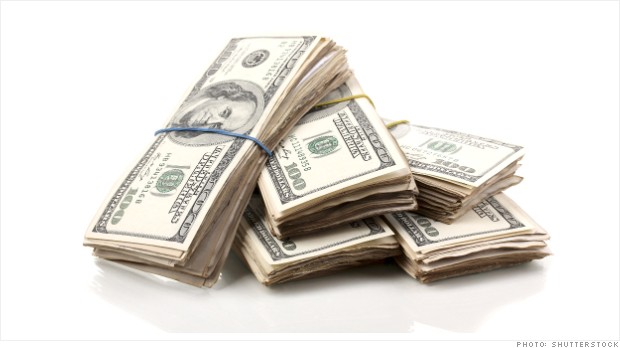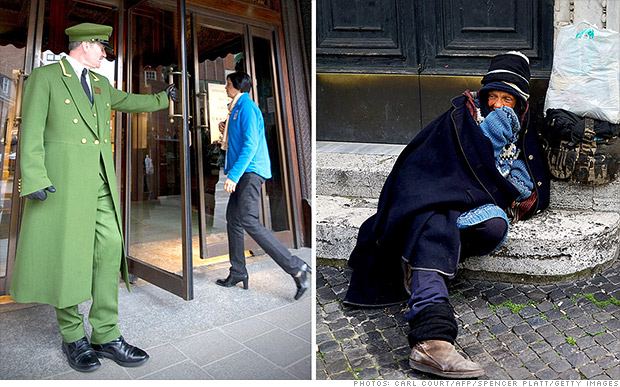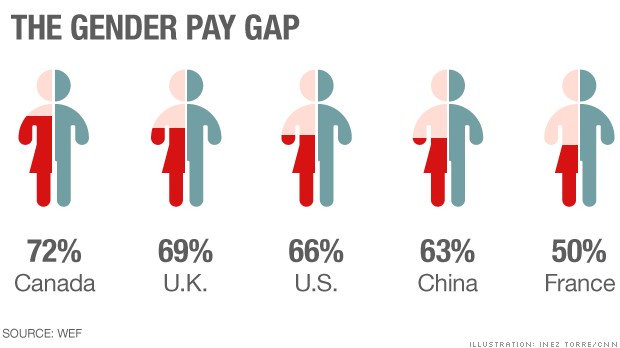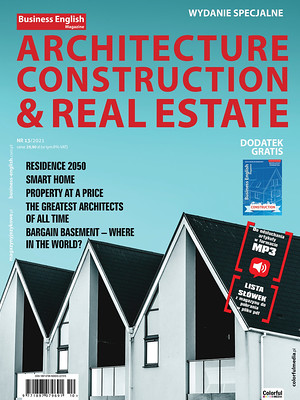…And the Rich Get Richer!
 The crisis is over and global economy is no longer in such dire straits it used to be mere five years ago. But there’s some nagging voices here and there that the emperor’s new clothes are, in fact, made of nothing but air. The newest report released by Oxfam, an international charity organization devoted to ending global poverty, proves that not everything is right with global economy. In fact, while it may appear to be fine, it’s likely poised for an even larger catastrophe in the future, unless we do something about the growing wealth inequality…
The crisis is over and global economy is no longer in such dire straits it used to be mere five years ago. But there’s some nagging voices here and there that the emperor’s new clothes are, in fact, made of nothing but air. The newest report released by Oxfam, an international charity organization devoted to ending global poverty, proves that not everything is right with global economy. In fact, while it may appear to be fine, it’s likely poised for an even larger catastrophe in the future, unless we do something about the growing wealth inequality…

If you’re worried about the direction our economy has taken of late, this time of year should prove deliciously scary, for it’s high time for another in the series of hair-raising, spine-tingling sets of global poverty data released by Oxfam. The worst findings this year concern the super-rich and the super-poor. Just 85 of the world’s richest people, cites this year’s report, own as much money as an entire half of global populace – the dirt poor half. To put this into less abstract terms: less than a hundred people in the world have as much money as almost 3.5 billion combined!

What’s more, the number of those who have a billion dollars (or more) more than doubled in the wake of the economic crisis. There’re now 1646 people on the globe that fit that description, whereas at least a cool billion was owned by just around 800 people before that.
If that statistic is not scary in and of itself, consider how these billionaires fared over time since the crisis. Sure, their numbers had swelled, but in the last four years, the mega-rich have also increased their combined wealth by a staggering 124%, meaning their overall wealth increased despite them becoming a larger group. That’s around USD 668 mln every year that they put into their accounts, and it amounts to a pretty astonishing total increase of USD 5.4 trln. According to the last year’s Credit Suisse report, around USD 110 trln out of USD 242 trln of total global wealth resides in the hands of 1% of its inhabitants. Are you sufficiently rattled yet? No? Continue reading…

And so, the rich do get richer and it’s not just a proverb the less wealthy use to justify their lack of success in life. But perhaps the fact that wealth gets concentrated among just a few people means they can spread it closer to home, owing to the so-called trickle-down effect? Researchers at the Manhattan Institute claim it is so, that globally, where there’s very rich people, there’s a generally higher standard of living.

Unfortunately, the statistics don’t corroborate that theory. The Oxfam report found that the amount of poverty-stricken Mexicans grew by 3% since 2010. Considering Mexico is still very much a developing country, it should come as no surprise… But by the same measure, it might be unsettling to learn that Mexican potentate Carlos Slim is still one of the top three richest men on the planet. He had even regained his crown as the king of billionaires, bouncing back to the top earlier this year for a short while. He has since been replaced by Bill Gates, who now boasts USD 81.3 bln to his name, according to Forbes Billionaire list. But while Slim is now no.2 globally with „just” USD 79.7 bln in assets, his own country’s standard of living is one of the lowest in this part of the world. And even though the US still has the biggest concentration of billionaires, it’s nowhere near as rich per capita as it should be if the trickle-down effect were to be observable, despite the many charitable efforts of the current reigning mister moneybags, Bill Gates.

The same holds true for all the developing countries. Their economies may seem to be booming, and their GDPs certainly improve because of their natural resources or international investments, but the average Joe in these countries doesn’t see his daily lot improve at the same rate, or even at all. The report calls it being „trapped in poverty”, where no matter how good the country is economically, its poorest residents just can’t catch a break – and neither can their children, or their children’s children. The situation by no means improves if you look at it from a different angle, either. „In 2013, seven out of 10 people lived in countries where economic inequality was worse than 30 years ago,” reads the Oxfam website’s report page.

To prove that that worrying trend exists, Oxfam report provides an interesting view of Zambia. That’s one of the few African countries that have shown considerable GDP and overall economy improvements in recent years. Zambia has grown by 6% a year this past ten years, so much so that it’s now becoming a typical middle-class economy. In reality, however, the amount of Zambian citizens that are living below the breadline grew from whopping 65% to tragic 74%, making it a country where nearly 3 out of every 4 people, young or old, are always hungry, have nowhere to live and have no immediate prospects of that changing – and it’s a second or third generation that was born like this! Data don’t lie: in Sub-Saharan Africa, home to 16 of the world’s richest, there’s 358 million impoverished people struggling to survive, and while the first number grows, the other one just refuses to go down.
The false facade of good economy created by inequality in wealth distribution leads to even more tragedy. Most of the world’s fifty most dangerous cities are the favela–ridden metropolises of Latin America. While some of the countries fare quite well (e.g. Brazil), most large cities the continent over can boast highest homicide rates in the world. The number of people killed there over the last decade is measured in millions, and nearly all of these murders were motivated by poverty.
In fact, globally, the current split between those who have and those who do not is worse than in 1820, according to data collated by hundreds of researchers at OECD (Organization for Economic Co-operation and Development). OECD puts a darker spin on this still, adding that this is the most worrying global trend in the last 200 years. It’s a harsh analysis, but more acute if we consider that in 1820 there was still slavery in the US and no-one even considered the possibility of providing a common standard of education and material well-being. In essence, the western world made a step back, and yet we still deem our economy somehow more diverse and better than it used to be.

„In highlighting the problem of inequality Oxfam not only speaks to the interests of the poorest people but also the wider collective interest: there is rising evidence that extreme inequality harms, durably and significantly, the stability of the financial system and growth in the economy,” says Andrew Haldane, chief economist at Bank of England, in support of the report’s findings.
Interestingly enough, the Oxfam report doesn’t criticize actual billionaires themselves. It’s not even the capitalist system that may be to blame, but rather the result of the way the economy is steered by policy-makers. There’re symptoms of a larger and more troubling trend that is built into the way we think about wealth and being rich. „The consequences of extreme inequality are harmful to everyone – it robs millions of people of better life chances and fuels crime, corruption and even violent conflict. Put simply, it is holding back efforts to end poverty,” says Mark Goldring, Oxfam’s chief executive, about this worrying tendency.
„It is not only dangerous because of income inequality per se,” adds Winnie Byanyima, Oxfam’s executive director, explaining that „If we don’t break out of this, power and wealth, privilege and opportunity are going to keep passing on from one generation to another, to a few people.”

Is all lost then, should we eat our freshly carved pumpkins instead of throwing them out? Thankfully, no. Oxfam report suggests that first and foremost, governments should curb tax evasion and tax the super-rich fairly. Any laws that promote equal pay will also help immensely – it seems that the glass ceiling is actually there at the very top, since there are very few women among that wealthy elite. Oxfam’s Even It Up campaign calls for equality not just in wealth distribution, but also insofar as narrowing the pay gap that exists between men and women. Hopefully, both these calls will be heeded by the super-rich and they decide to share more than they do now…
VOCABULARY
in dire straits – w opałach
mere – ledwo, ledwie
nagging – naprzykrzający sie
the emperor’s new clothes – nowe szaty króla
to release – opublikować
charity – charytatywny, dobroczynny
devoted to sth – poświęcony czemuś, zajmujący się czymś
poverty – ubóstwo, bieda
to be poised for sth – być w najlepszej pozycji do czegoś
wealth – bogactwo
inequality – nierówność
to take some direction – obrać jakiś kierunek
of late – ostatnio
deliciously – rozkosznie
it’s high time for sth – czas najwyższy na coś
hair-raising – jeżący włosy na głowie
spine-tingling – przejmujący
data – dane
findings – wyniki (badania)
to concern sth – dotyczyć czegoś
the super-rich – najbogatsi ludzie świata
to cite – cytować, przytaczać
entire – cały
populace – populacja, mieszkańcy
dirt poor – koszmarnie biedny (US)
to put sth into X terms – opisać coś jakimiś słowami
combined – razem wzięty
to double – podwoić się
in the wake of sth – w następstwie czegoś
to fit some description – pasować do jakiegoś opisu
whereas – podczas gdy
cool – okrągły (o sumce)
to consider – rozważyć, zastanowić się
to fare – radzić sobie, powodzić się (komuś/dobrze lub źle)
to swell – wzrosnąć
staggering – ogromny, oszałamiający
overall – ogółem, ogólny
despite – pomimo
account – konto
to amount to X – wynosić X, składać się na X
astonishing – oszałamiający
according to – zgodnie z, według
to reside – znajdować się, spoczywać
inhabitant – mieszkaniec
sufficiently – wystarczająco
rattled – tu: zdenerwowany
proverb – powiedzenie
to justify sth – uzasadnić coś
lack – brak
to spread sth – rozprowadzić
owing to sth – dzięki czemuś, za przyczyną czegoś
so-called – tak zwany
trickle-down effect – efekt stopniowego przesączania się bogactwa ludzi najbogatszych do mniej bogatych (za pośrednictwem wydawania pieniędzy, tworzenia nowych spółek itp.)
researcher – badacz
to claim – twierdzić
to corroborate sth – potwierdzać coś, wspierać
poverty-stricken – dotknięty ubóstwem, najuboższy
developing – rozwijający się
to come as no surprise – nie dziwić, nie wydawać się niczym dziwnym
by the same measure – w ten sam sposób, patrząc na to z tego samego punktu widzenia
unsettling – niepokojacy
potentate – potentat, magnat
to regain – odzyskać
to bounce back – odbić się, wrócić do poprzedniego stanu
to replace – zastąpić
to boast sth – móc się czymś pochwalić/poszczycić
assets – majątek, zasoby
nowhere near – ani trochę, wcale (nie)
per capita – na osobę
observable – dostrzegalny, widoczny
reigning – rządzący, panujący
mister moneybags – tu: pan bogacz, rockefeller
to hold true for sth – być prawdziwym jeśli chodzi o coś
booming – kwitnący
GDP (gross domestic product) – produkt krajowy brutto, PKB
to improve – poprawiać się, ulepszać
average Joe – przeciętny Kowalski
daily lot – codzienne życie, sytuacja życiowa na co dzień
rate – tu: prędkość
trapped – zniewolony, usidlony
sb just can’t catch a break – komuś się nie wiedzie, ktoś cały czas obrywa od życia
by no means – wcale, ani trochę
angle – kąt, punkt widzenia
to exist – istnieć
to provide – pokazać
view – pogląd, punkt widzenia
considerable – znaczny
citizen – obywatel
below the breadline – poniżej granicy ubóstwa
whopping – gigantyczny
immediate – najbliższy
prospects – perspektywy
generation – pokolenie
impoverished – zubożały, ubogi
to struggle to do sth – borykać się z czymś, ledwo dawać radę coś zrobić
to survive – przetrwać
to refuse – odmawiać
facade – fasada, maska
favela – fawela, dzielnica nędzy/slumsy dokoła wielkich miast Południowej Ameryki
X-ridden – pełen X, wypełnioniy X
homicide – zabójstwo
to measure – mierzyć
to put some spin on sth – ukazać coś w jakimś świetle
harsh – surowy, ostry
acute – dotkliwy, trafiający w samo sedno
slavery – niewolnictwo
common – wspólny, powszechny
well-being – dobrobyt
in essence – w gruncie rzeczy
to deem sth sth – uznawać coś za coś/jakieś
diverse – różnorodny
to highlight sth – naświetlić coś, uwypuklić
evidence – dowody
extreme – skrajny
to harm – szkodzić, ranić
durably – trwale
significantly – znacząco
in support of sth – popierając coś, w ramach poparcia wobec czegoś
sth is to blame – coś należy obraczyć winą, coś należy uznać za winne
to steer – sterować, kierować
policy-maker – decydent
troubling – niepokojący
harmful – szkodliwy
to rob sb of sth – okraść kogoś z czegoś
to fuel – napędzać, motywować
crime – zbrodnia, przestępczość
violent – pełen przemocy
to hold sth back – powstrzymywać coś, hamować
chief executive – dyrektor naczelny
per se – jako taki, sam w sobie
to break out of sth – wyrwać się z czegoś
privilege – tu: życie w dostatku, życie w luksusach
to pass on – przekazywać
thankfully – szczęśliwie, na szczęście
carved – wycięty, wyrzeźbiony
first and foremost – po pierwsze, w pierwszej kolejności
to curb – ograniczyć, powstrzymać
tax evasion – unikanie/uchylanie się od płacenia podatków
fairly – uczciwie
equal pay – równa płaca (dla mężczyzn i kobiet)
immensely – ogromnie, w ogromnym stopniu
glass ceiling – szklany sufit (niewidzialna bariera, która sprawia, że kobiety otrzymują mniej godziwe wynagrodzenie za taką samą pracę jak mężczyźni)
to even sth up – wyrównać coś, zrównać
insofar as… – co się tyczy…, w odniesieniu do…
gap – luka, rozpiętość
to heed sth – usłyszeć coś, przysłuchać się czemuś
by Prochor Aniszczuk







